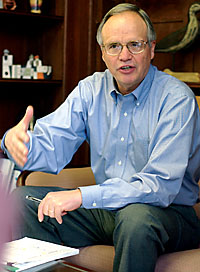YALE’S GROWING ‘GREEN’ INITIATIVES |
| SPECIAL SUPPLEMENT
SPECIAL SUPPLEMENT |
| APRIL 2008
APRIL 2008
 | Gus Speth, dean of Yale's School of Forestry & Environmental Studies, contends that "Henceforth, it will be impossible for politicians to ignore the issue" of climate change.
|
F&ES dean is an advocate for environmental
action on and off campus
For more than three decades, J. Gustave Speth, the Carl W. Knobloch Dean of
Yale’s School of Forestry and Environmental Studies (F&ES), has tried
to make the world’s citizens aware of the urgent need to change habits
that are destroying the planet.
In a major federal report issued more than 25 years ago, called the “Global
2000 Report,” Speth called for prompt action to curb the use of fossil
fuels and other human activities that contribute to an increase of atmospheric
carbon dioxide.
He made a similar plea for a global mobilization of resources to preserve the
Earth and move to sustainable living in his 2004 book “Red Sky at Morning:
America and the Crisis of the Global Environment” and in the newly released “The
Bridge at the Edge of the World: Capitalism, the Environment and Crossing from
Crises to Sustainability.” Both books focus mainly on actions that are
needed.
“If we continue to do exactly what we are doing, with no growth in the
human population or the world economy, the world in the latter part of this century
will be unfit to live in,” comments Speth in “The Bridge at the Edge
of the World.” “Of course, human activities are not holding at current
levels — they are accelerating, dramatically, and so, too, is the pace
of climate disruption, biotic impoverishment and toxification.”
Speth has spread this message in the various capacities in which he has served:
as co-founder of the Natural Resources Defense Council, chair of the President’s
Council on Environmental Quality under President Jimmy Carter; president and
founder of the World Resources Institute, as the chief executive officer of
the United Nations Development Program; and in his role at Yale, where he has
been dean since 1999.
In his own research, he also examines the
issues that have contributed to such global-scale environmental issues as species
and biodiversity loss, tropical deforestation, desertification, climate change,
ozone layer depletion, overfishing, fresh water shortages and environmental
toxification. For his contributions, he has won many international honors,
including the prestigious Blue Planet Prize, one of the world’s top environmental
awards.
While he acknowledges an increase in public awareness of the problem of global
climate change, he is not as certain that governments will take timely action
to remedy the problem.
“I think we’ve passed a threshold on the climate issue,” he
said in a recent interview. “Henceforth, it will be impossible for politicians
to ignore the issue. Whether they’ll behave responsibly at this point remains
to be seen. But the fact is, whether they take action now or later, they recognize
that they have to do something.”
Under his leadership as dean, Speth has helped enhance environmental education
at both the undergraduate and graduate levels. He assisted in the establishment
of the environmental studies major for undergraduates and has shepherded F&ES
in a process of major change and expansion. He has also been instrumental in
ensuring that the new home of F&ES, Kroon Hall, will be a fully sustainable
building. The building will be completed in 2009. (See related story.)
Speth, who has also been an outspoken advocate for a greater environmental
consciousness at Yale, applauds members of the University community and President
Richard C. Levin for their commitment to making dramatic changes in operational
and day-to-day practices to create a more sustainable campus.
“Our president has taken a leadership role not only in creating a greener
Yale, but in encouraging other higher education institutions in the world to
do the same,” says Speth, who is also the Sara Shallenberger Brown Professor
in the Practice of Environmental Policy. “Students in Yale College, at
F&ES and in other places across the campus are determined to tackle global
environmental issues, and Yale staff members are actively engaged in seeking
and practicing more environmentally friendly methods of doing all the various
kinds of business that go on here.
“We’re just at the beginning of an environmental revolution on our
campus.”
-
Introduction
Leading by action to promote a better future
New energy programs helping Yale to achieve its goal of
reducing greenhouse emissions 43% by 2020
Newest campus buildings have many earth-friendly features
Office works to make sustainability ‘everyone’s business’
In dining halls and classrooms, project raising awareness about relationship between ‘people, land and food’
Recycling ensures University’s trash is not going to waste
Regulated waste gets special treatment at OEHS
Eli Exchange
Adding zip to Yale’s sustainable transportation options
F&ES dean is an advocate for environmental action on and off campus
Yale experts tackling wide range of environmental issues
Scores of educational programs are devoted to ecological topics
‘Eco-friendly’ Yale merchandise
-
Yale Bulletin & Calendar
|

 YALE’S GROWING ‘GREEN’ INITIATIVES
YALE’S GROWING ‘GREEN’ INITIATIVES |
| SPECIAL SUPPLEMENT
SPECIAL SUPPLEMENT |
| APRIL 2008
APRIL 2008
